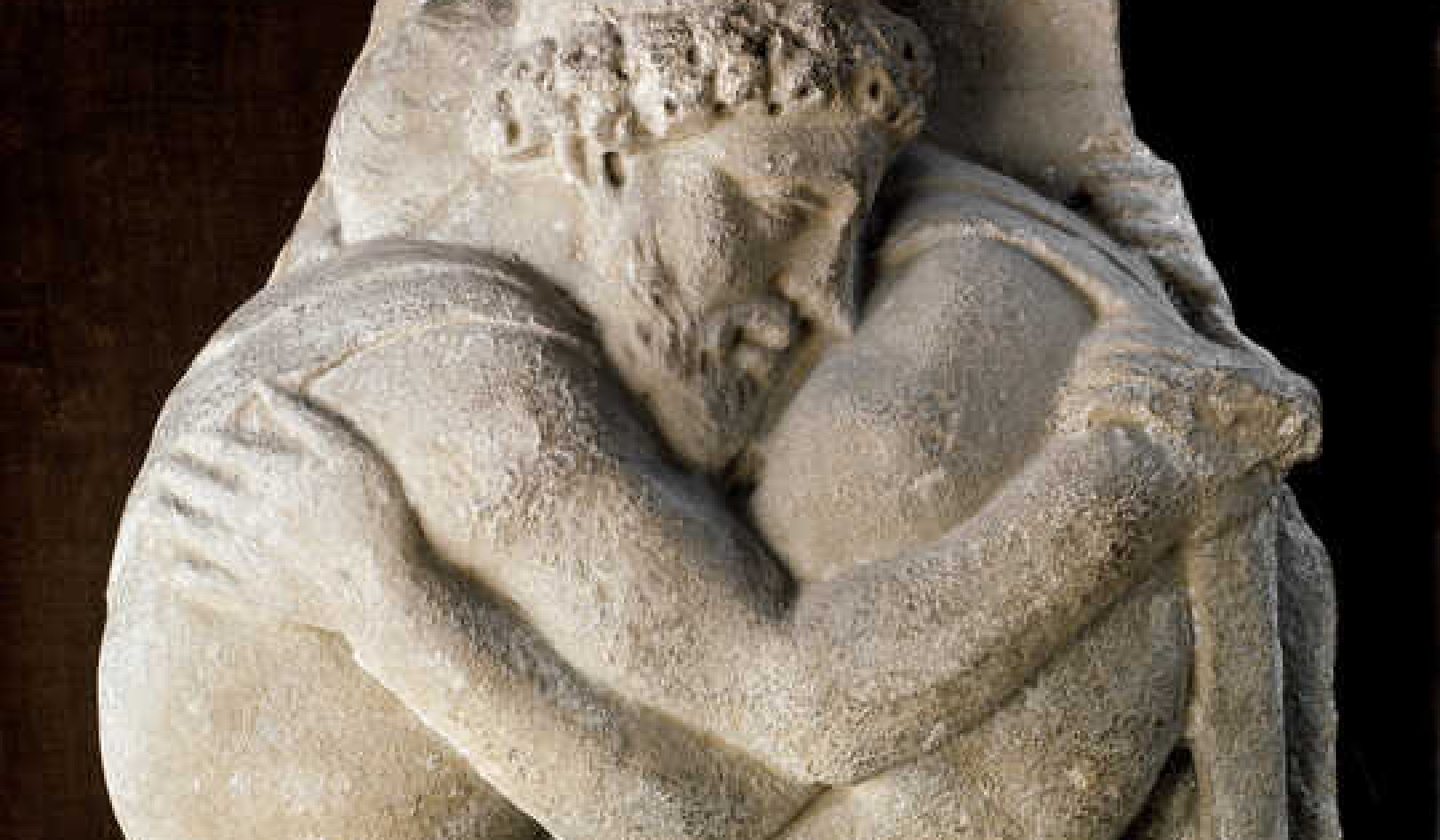
Photo credits: BK. (cc 2.0) Original photo was black and white.
This Greek tale is concerned with one of the great mysteries of the family: Where do our gifts and talents come from? The story tells us about a gift which is passed down from a god to his human descendants. It suggests that the misuse of inherited gifts can end in disaster, and that it is up to us to use our talents to serve rather than control life.
COMMENTARY
There has always been a debate about whether intelligence is something we inherit. All kinds of causes, from environment to education to cultural emphases, are offered to explain why cleverness seems to run in families. However, whether or not intelligence is inherited, the maturity and morality which enable us to use it wisely are not genetic, and remain in the hands of each individual – as well as in the hands of parents who teach their children to value that which is on the side of life.
The Greeks believed in the inheritance of gifts; they assumed that if a god or demi-god, such as Aeolus, stood behind a human line, then his descendants inherited some of his attributes, perhaps diluted over successive generations, but nevertheless present in each family member.
Intelligence, in Greek myth, is no less a talent than music, martial prowess or the gift of prophecy. And if the mortals who inherit such talents are foolish enough to forget their mortal limits and offend the gods, then they and they alone – not the gods – are responsible for their bad ends.
Aeolus, part god and part wind-spirit, is pious, and honored accordingly. But his son Sisyphos has neither conscience nor humility and is subjected to a terrible eternal punishment.
How do we give our children a framework of values within which they can develop their talents without succumbing to arrogance and delusions of grandeur? Too rigid a framework stifles talent; the absence of any framework leads to undeveloped potential or the abuse of innate gifts.
One significant feature in the story of the descendants of Aeolus is that the fathers do not stay around to help provide such a framework for their children. The gift is inherited, but there is no loving and supportive container in which it can grow alongside a recognition of human limits.
Aeolus is too busy ruling the winds to bother with Sisyphos; Sisyphos is too busy cheating travellers to bother with Glaucus; Glaucus is too preoccupied with chariot races to bother with Bellerophon; and Bellerophon, the most attractive of this line and the one most like his ancestor Aeolus, is himself ultimately unable to restrain himself because no one has taught him how to do it. He murders his brother in a rage and, only then, recognizes his great weakness. But by this time he is an adult, and restraint comes hard. He knows what he should do. But when the crunch comes, he can resist the wiles of a woman but not the luxury of his self-aggrandizement.
This story of a clever but arrogant family line tells us many things about choice and responsibility. The heroes of myth, whether male or female, are symbols of the special qualities in each of us which give us a sense of individual meaning and destiny.
Because every person has some gift which makes him or her unique, we are all ‘descended from gods’ in the Greek sense. And we all have the capacity to use our gifts for good or ill.
It may be that our talents are the products of an encouraging environment; or it may be that they are inherited along with the color of our eyes and hair. Or perhaps both are true.
This story teaches us that intelligence without respect for the value and worth of others can be a double-edged gift which ultimately rebounds on its possessor. Where do we learn what the Greeks understood as respect for the gods? This does not require any specific religious framework, although every great religion offers a code of behavior in accord with the ‘will of God’. But piety in the Greek sense demands a recognition of the unity of life and the worth of all things living.
The gods are, after all, symbols of the many facets of life itself. We might learn from Bellerophon that, however capable we are, we cannot aspire to Olympus. We can only be human, and must use our gifts with humility.
The Myth: The Children of the Wind
The lord of the winds was called Aeolus. He was clever and ingenious, and it was he who invented ships’ sails. But he was also pious and just, and honored the gods; thus his divine father Poseidon, god of the sea, made him guardian of all the winds.
Aeolus’ son Sisyphos inherited his intelligence, adaptability and ingenuity, but not, unfortunately, his piety. Sisyphos was a cunning rogue and a cattle thief who won a kingdom by treachery; and once in power he proved to be a cruel tyrant. His method of executing his enemies – not to mention rich travellers rash enough to risk his hospitality – was to peg them on the ground and crush them with stones.
In the end, Sisyphos went too far and cheated Zeus, king of heaven. When Zeus stole a girl from her father and hid her, Sisyphos was the only person on earth who knew where she was; and he promised Zeus he would keep the secret. But in return for a bribe, he told the girl’s father where to find the lovers.
Lies, Deception, Cunning and Trickery
His reward from Zeus was death. But clever Sisyphos tricked the death-god Hades, tied him up and locked him in a dungeon. Now that the lord of the underworld was a prisoner, no mortal in the world could die. This was particularly galling to Ares the war-god, since all over the world men were being killed in battle only to spring back to life and fight again. Eventually Ares freed Hades, and the two of them frog-marched Sisyphos to the underworld.
Refusing to admit defeat, Sisyphos played another cunning trick to escape his fate. When he arrived in the underworld, he went straight to Queen Persephone and complained that he had been dragged down alive and unburied, and that he needed three days in the upper world to arrange his funeral. Suspecting nothing, Persephone agreed, and Sisyphos went back to the mortal world and continued his life exactly as before.
In desperation, Zeus sent Hermes, who was cleverer even than Sisyphos, to bring him to his appointed doom. The judges of the dead gave Sisyphos a punishment to suit both his trickery and his cruel method of killing people with stones. They placed a huge rock above him on a steep hillside. The only way he could prevent it rolling back and crushing him was to push it up the hill.
Hades promised that if he ever succeeded in pushing it over the top and down the other side, his punishment would end. With immense effort, Sisyphos heaved the boulder to the edge of the downward slope, but the huge rock always tricked him, slipping out of his grasp and chasing him all the way back down the hill. This was his doom until the end of time.
The Sins of the Fathers
Back on earth, Sisyphos had left sons and grandsons, and all of them inherited the sparkling intelligence of the wind-lord Aeolus. But they did not use the gift wisely.
Sisyphos’ son was called Glaucus. He was a clever horseman but, scorning the power of the goddess Aphrodite, he refused to let his mares breed. He hoped by this means to make them more spirited than other contestants in the chariot races which were his chief interest. But Aphrodite was vexed at this violation of nature by human machination and led the mares out by night to graze on a special herb. As soon as Glaucus yoked the mares to his chariot the next day, they bolted, overthrew the chariot, dragged him along the ground entangled in the reins and then ate him alive.
The son of Glaucus was called Bellerophon. This handsome young man had inherited his great-grandfather Aeolus’ inventiveness and quick wit, his grandfather Sisyphos’ fierce temper and his father Glaucus’ arrogance. One day Bellerophon had a violent argument with his brother and killed him. Horrified by his crime, he took a vow never to show emotion again and fled from his native land.
Fear of Emotions
He wandered through many countries and eventually arrived at the rock-fortress of Tiryns, where the queen took a fancy to him and invited him to become her lover. Bellerophon, wisely fearing the emotional consequences, declined. But no one had ever refused the queen of Tiryns before.
Humiliated and enraged, she went secretly to her husband and accused Bellerophon of attempted rape. The king was reluctant to punish Bellerophon and risk the Furies’ vengeance by the direct murder of a suppliant. He therefore sent Bellerophon to the court of his wife’s father, the king of Lycia, with a sealed letter which read, ‘Pray remove the bearer from this world; he has tried to violate my wife, your daughter.’
The king of Lycia duly sent the young hero on a series of deadly quests. For his first task, Bellerophon had to kill Chimaera, a fire-breathing monster which lived on a nearby mountain, terrorizing the people and scorching the land.
Bellerophon was intelligent enough to know that he needed help quickly. He consulted a seer, who gave the hero a bow, a quiver of arrows and a spear tipped with a large block of lead instead of a point. Then Bellerophon was instructed to go to a magical fountain where he would find the winged horse Pegasus drinking. Bellerophon must tame the horse, bridle him, and fly on his back to fight Chimaera.
All this Bellerophon duly did, destroying the fire-breathing monster by hurling the lead-tipped spear into its throat so that the lead melted, ran down into its lungs and choked it. Returning to Lycia, he defeated the enemies the king sent against him by pelting them from the sky with stones. In the end, the king recognized a champion in Bellerophon, and gave him his daughter and half his kingdom.
Rage and Revenge
Up until now Bellerophon had used his inherited intelligence while curbing his arrogance and impetuousness. But, when he eventually discovered that it was the queen of Tiryns who had been responsible for all his troubles, Bellerophon’s rage overcame him and he flew on the winged horse to Tiryns, snatched the queen thousands of feet into the air and dropped her to her death. Then, full of his own hot-headedness and the excitement of flying like the wind – his great-grandfather Aeolus was, after all, lord of the winds – he decided to soar still higher and visit the gods themselves. But mortals cannot enter Olympus unless a god invites them. Zeus sent a fly to sting Pegasus; the winged horse reared, and Bellerophon plunged to his death.
©1999 and 2017 by Liz Greene and Juliet Sharman-Burke.
All rights reserved. Reprinted with permission of the publisher,
Weiser Books, imprint of Red Wheel/Weiser LLC.
Article Source
 The Mythic Journey: Use Myths, Fairy Tales, and Folklore to Explain Life's Mysteries
The Mythic Journey: Use Myths, Fairy Tales, and Folklore to Explain Life's Mysteries
by Liz Greene and Juliet Sharman-Burke.
Click here for more info and/or to order this book.
About the Authors
 Liz Greene is a world-renowned analytic psychologist and leading authority on mythology, astrology, and psychology. She is co-founder and director of the Centre for Psychological Astrology. She is the author of numerous books including Astrology for Lovers and The Mythic Tarot. Visit the Author's Website.
Liz Greene is a world-renowned analytic psychologist and leading authority on mythology, astrology, and psychology. She is co-founder and director of the Centre for Psychological Astrology. She is the author of numerous books including Astrology for Lovers and The Mythic Tarot. Visit the Author's Website.
 Juliet Sharman-Burke is a practicing analytic psychotherapist who has taught tarot and astrology for twenty years. She is administrator and tutor at the Centre for Psychological Astrology in London. She is the author of The Complete Book of Tarot, Mastering the Tarot and, with Liz Greene, the The Mythic Tarot card-and-book set.
Juliet Sharman-Burke is a practicing analytic psychotherapist who has taught tarot and astrology for twenty years. She is administrator and tutor at the Centre for Psychological Astrology in London. She is the author of The Complete Book of Tarot, Mastering the Tarot and, with Liz Greene, the The Mythic Tarot card-and-book set.

























